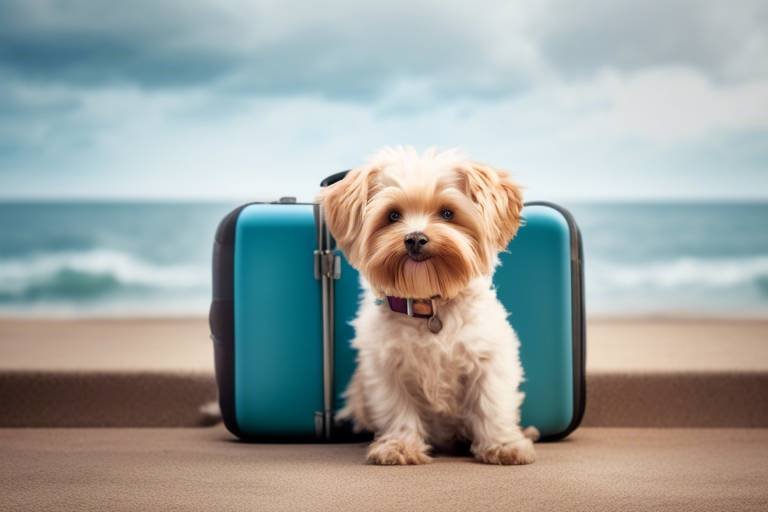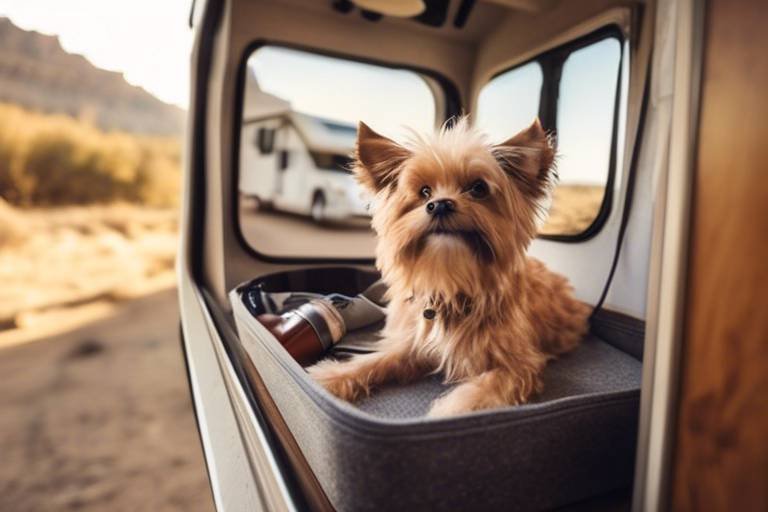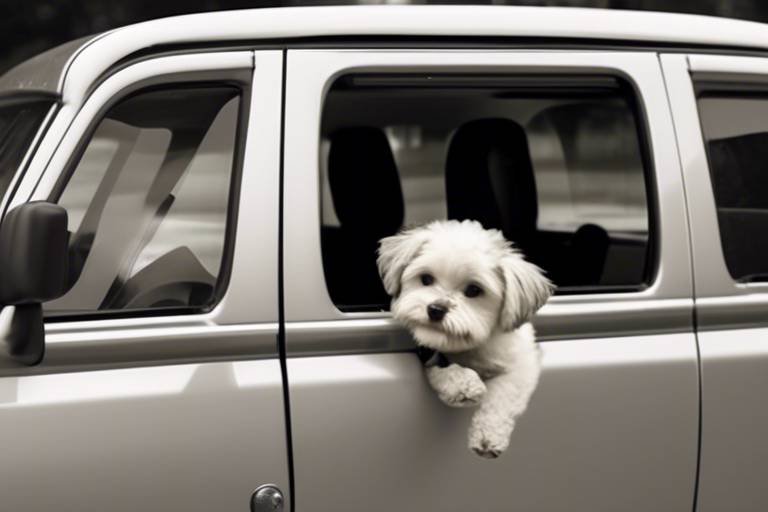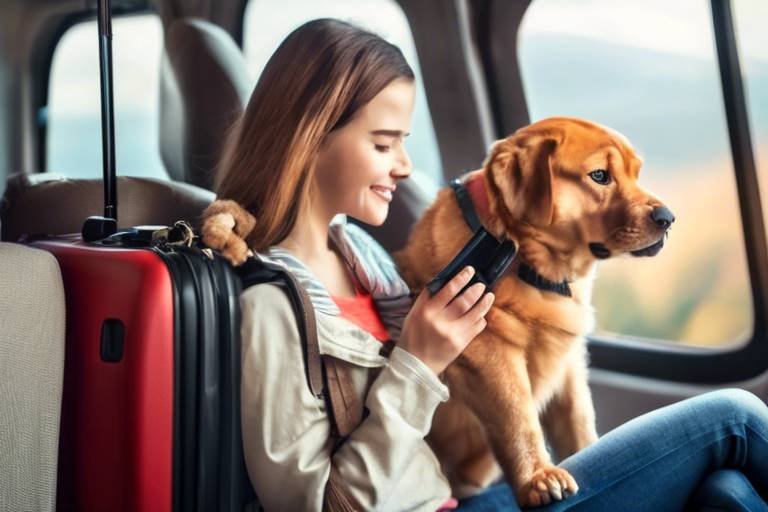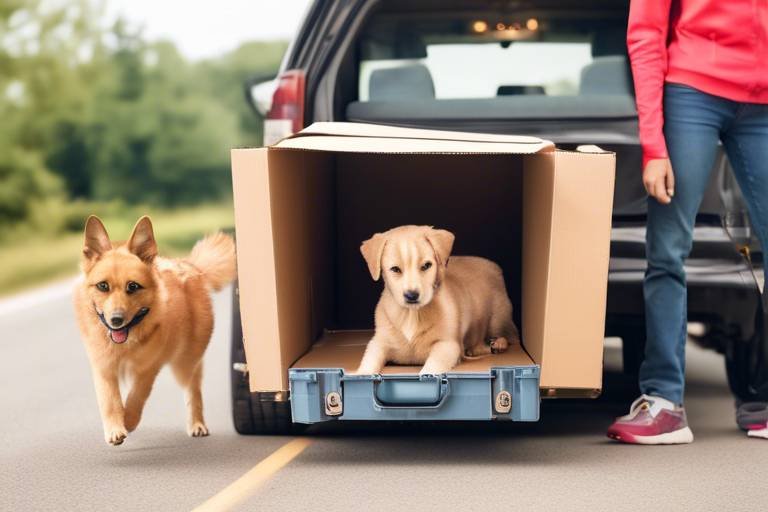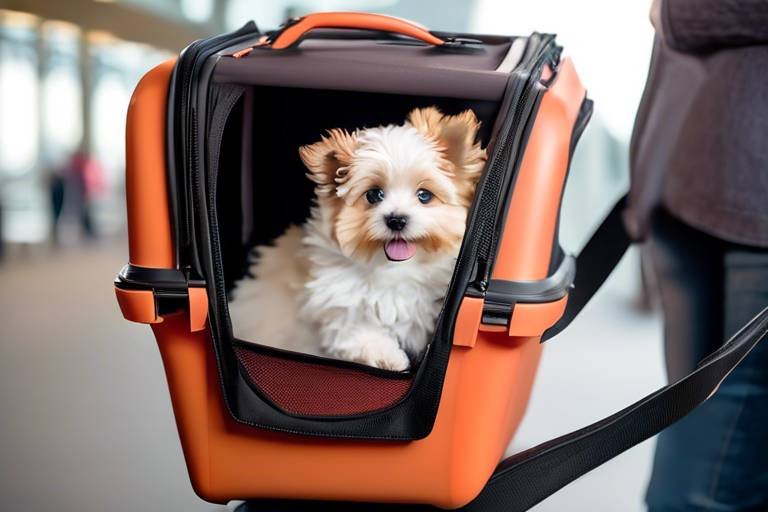How to Make Your Pet a Travel Companion
Traveling with your furry friend can be one of the most rewarding experiences, transforming a simple trip into an adventure filled with joy and companionship. Imagine exploring new places, hiking through scenic trails, or relaxing on a beach, all while your pet is by your side. However, making your pet a travel companion requires some thoughtful preparation and consideration. This article explores practical tips and strategies for making your pet an enjoyable and safe travel companion, ensuring both you and your furry friend have a memorable journey together.
Not all pets are suited for travel, and that's perfectly okay! Some pets thrive on adventure, while others prefer the comfort of their home. When selecting a travel-friendly companion, consider the following factors:
- Temperament: Is your pet calm and adaptable, or are they more anxious and skittish? A laid-back pet is generally easier to travel with.
- Size: Larger pets may require more space and can be cumbersome in confined areas, while smaller pets are usually more portable.
- Health: Ensure your pet is physically fit for travel. Pets with health issues may not handle the stress of traveling well.
Ultimately, the right pet for travel is one that enjoys new experiences and can adapt to various environments. If your pet has a curious and adventurous spirit, they might just be the perfect travel buddy!
Preparation is key to a successful trip. Just like you wouldn’t embark on a journey without packing your essentials, your pet needs to be well-prepared too. Start by scheduling a visit to the veterinarian to ensure your pet is healthy and up-to-date on vaccinations. This not only protects your pet but also gives you peace of mind while traveling.
Before you hit the road, it’s crucial to ensure your pet is healthy. A thorough health check can help identify any potential issues that could arise during your travels. Make sure your pet’s vaccinations are current, especially for rabies and other diseases that could be prevalent in your travel area. Here’s a quick checklist of necessary vaccinations:
| Vaccination | Recommended For |
|---|---|
| Rabies | All pets |
| Bordetella | Dogs (especially if staying in kennels) |
| Feline Distemper | Cats |
Locating a reliable veterinarian is essential for travel. You never know when you might need professional help, so it’s wise to research and find a vet in your travel destination beforehand. Look for reviews and ask fellow travelers for recommendations. Having a trusted vet on speed dial can make all the difference in case of an emergency!
If your pet has special needs, additional considerations are necessary. Whether it’s mobility issues, dietary restrictions, or medication schedules, planning ahead is crucial. Here are some tips to ensure their comfort and safety:
- Bring extra supplies: Always pack more than you think you’ll need, including food, medication, and comfort items.
- Plan for breaks: Schedule frequent stops during long journeys to allow your pet to stretch and relieve themselves.
- Consult your vet: Before traveling, discuss your plans with your veterinarian to get tailored advice for your pet’s specific needs.
Training your pet can significantly improve their travel experience. Start with basic commands like “sit,” “stay,” and “come.” These commands can be lifesavers in unfamiliar environments. Additionally, consider taking your pet on short trips leading up to your big adventure. This gradual acclimatization helps them adjust to new experiences and reduces anxiety during longer travels.
Finding the right place to stay is vital for a successful trip. Not all hotels or rentals welcome pets with open arms, so it’s important to do your homework. Look for accommodations that specifically advertise themselves as pet-friendly. Many places offer amenities for pets, such as dog parks or pet-friendly rooms, which can enhance your stay.
Understanding pet policies is crucial when booking accommodations. Some places may charge additional fees or have restrictions on pet size or breed. Always read the fine print and confirm with the hotel or rental property before you arrive to avoid any surprises. A quick phone call can save you from a stressful situation upon check-in!
Packing the right items is key to a smooth journey. Ensure you have the essentials, including:
- Food and water bowls
- Leash and harness
- Comfort items like a favorite blanket or toy
- First aid kit specifically for pets
Having these items on hand will help keep your pet comfortable and happy throughout the trip. Remember, a happy pet makes for a happy traveler!
1. Can I take my pet on an airplane?
Yes, many airlines allow pets to travel, either in the cabin or as cargo. Be sure to check the airline's pet policy before booking your flight.
2. What should I do if my pet gets anxious while traveling?
Consider using calming products, such as pheromone sprays or anxiety wraps, and consult your vet for additional recommendations.
3. Are there any pet-friendly travel apps?
Yes, there are several apps designed to help pet owners find pet-friendly accommodations, parks, and restaurants along their travel route.

Choosing the Right Pet for Travel
When it comes to hitting the road with your furry friend, not all pets are created equal. Imagine trying to take a cat who despises car rides on a cross-country trip; it’s a recipe for disaster! So, how do you choose the right pet for your travel adventures? The key lies in considering several important factors, including temperament, size, and health. Each of these attributes plays a crucial role in determining whether your pet will be a delightful travel companion or a challenge.
First off, let’s talk about temperament. Some pets are naturally more adaptable and calm than others. For instance, dogs that are well-socialized and enjoy meeting new people and experiences are generally better suited for travel. On the other hand, pets that are skittish or easily stressed might find the hustle and bustle of travel overwhelming. Think about your pet's personality: does your dog wag their tail at the sight of new places, or do they hide under the couch when the doorbell rings? This can give you a good indication of how they might handle travel.
Next up is size. While a tiny Chihuahua might fit comfortably in a carrier under the seat, a Great Dane could take up half the backseat! If you’re planning on traveling by plane, many airlines have strict size restrictions for pets in the cabin. It’s essential to consider how your pet’s size will impact your travel plans. Larger pets may need more space and can be more challenging to manage in crowded settings, while smaller pets can be easier to transport. However, don't underestimate the personality of smaller pets; they can be just as demanding!
Finally, health is a critical factor to consider. Before you embark on your journey, ensure your pet is in good health. Schedule a vet visit to discuss any potential travel risks and make sure their vaccinations are up to date. Some destinations may even require specific vaccinations or health certificates. If your pet has any pre-existing conditions, you’ll need to plan accordingly and ensure you have access to veterinary care along your route. The last thing you want is to be in a remote area with a pet that needs medical attention.
In summary, choosing the right pet for travel is about more than just picking a cute face. It involves a thoughtful consideration of their temperament, size, and health. By taking the time to evaluate these factors, you can ensure that your travels will be enjoyable for both you and your furry companion. After all, the goal is to create wonderful memories together, not to stress over a reluctant traveler!
- What types of pets are best for travel? Generally, dogs and some cats are more suited for travel than other pets. Dogs that are social and enjoy new experiences tend to be great travel buddies.
- How can I tell if my pet is ready for travel? Look for signs of adaptability and calmness in new situations. A healthy, well-socialized pet is usually a good candidate for travel.
- Are there any health checks I should do before traveling? Yes! Schedule a vet appointment to ensure vaccinations are up to date and discuss any health concerns.

Preparing Your Pet for Travel
When it comes to traveling with your furry friend, preparation is absolutely key. Just like you wouldn’t embark on a long road trip without packing your essentials, your pet needs a little pre-travel TLC to ensure a smooth journey. The first step in this process is to schedule a visit to the veterinarian. This isn't just a casual check-up; it’s an opportunity to ensure your pet is healthy enough for travel. You wouldn’t want to hit the road with a pet that’s feeling under the weather, right?
During this vet visit, make sure to discuss any necessary vaccinations that may be required for your destination. For example, if you're heading to a different country, certain vaccinations might be mandatory. The last thing you want is to be turned away at the border because your pet isn’t up to date on their shots!
It's not just about the shots, though. A thorough health check can help identify any underlying issues that could make the trip uncomfortable for your pet. Ask your vet about any medications your pet may need while traveling, especially if you’re going on a long journey. A little foresight can prevent a lot of stress later on.
Now, speaking of veterinarians, finding a reliable vet is essential when traveling. You want to ensure that you have access to veterinary care in case of emergencies. A quick online search can yield a list of vets in your destination area. You might also want to check reviews or ask fellow pet owners for recommendations. Trust me, knowing you have a vet nearby can give you peace of mind.
If your pet has special needs, preparing for travel requires even more consideration. For instance, if your furry friend is elderly or has mobility issues, you’ll want to think about how to accommodate those needs during your trip. This might include packing a comfortable bed, bringing along any necessary medications, or even scheduling more frequent breaks during travel. After all, a happy pet makes for a happy trip!
Another aspect to consider is acclimating your pet to travel environments. If your pet isn’t used to being in a car or on a plane, it’s a good idea to take them on short trips leading up to your big adventure. This will help them get accustomed to the sights, sounds, and sensations of travel, making the actual trip less stressful for both of you.
In addition, consider investing in a quality pet carrier or harness. This is not just for safety; it can also provide your pet with a sense of security during the journey. Just like you might feel more secure with your favorite blanket, your pet will appreciate having a familiar space to retreat to.
Finally, don't forget to pack a travel kit for your pet. This should include food, water, bowls, leashes, waste bags, and any toys that might help keep them entertained. A well-prepared pet is a happy pet, and a happy pet means a more enjoyable travel experience for everyone involved!
- What vaccinations does my pet need before traveling? It depends on your destination. Always check with your vet for the latest requirements.
- How can I help my pet adjust to travel? Gradually acclimate them to shorter trips and create a comfortable travel space.
- What should I pack for my pet? Essentials include food, water, bowls, medications, toys, and a comfortable carrier.
Health Check and Vaccinations
Before you embark on your exciting journey with your furry friend, it's essential to ensure that they are in tip-top health. A health check is not just a formality; it's a crucial step in safeguarding your pet's well-being during travel. Imagine planning a fantastic road trip only to find out that your pet is feeling under the weather—definitely not the ideal scenario! So, what should you focus on during this health check?
First and foremost, schedule a visit to your veterinarian. They will conduct a thorough examination to ensure your pet is fit for travel. During this visit, make sure to discuss any specific health concerns you might have. It's also the perfect opportunity to confirm that your pet is up to date on all necessary vaccinations. Some common vaccinations include:
- Rabies
- Distemper
- Parvovirus
- Bordetella (especially for kennel stays)
Many states and countries require proof of certain vaccinations for pets traveling across borders, so it’s essential to have these documents ready. You wouldn’t want to be turned away at the border because your pet is missing their rabies shot, right?
Additionally, consider discussing flea and tick prevention with your vet. These pesky critters can be more than just a nuisance; they can also pose serious health risks to your pet, especially in unfamiliar environments. Your veterinarian may recommend a preventive treatment that can keep your pet safe during the trip.
It’s also wise to inquire about any health certificates needed for travel. Some airlines and hotels require a health certificate issued by a veterinarian, stating that your pet is healthy and fit for travel. This certificate typically needs to be issued within a specific time frame before your trip, so plan accordingly!
Lastly, if your pet has any pre-existing health conditions or requires medication, make sure to pack an ample supply of their medications. It’s a good idea to carry a copy of your pet’s medical records, including any prescriptions, in case of emergencies. You never know when you might need to consult a local vet while on the road.
In summary, a thorough health check and up-to-date vaccinations are paramount for a safe and enjoyable trip with your pet. Not only does this protect your furry companion, but it also gives you peace of mind, allowing you to focus on making wonderful memories together.
Q: How far in advance should I schedule my pet's health check?
A: Ideally, schedule the health check at least a few weeks before your trip to allow time for any necessary vaccinations and paperwork.
Q: What if my pet is nervous about visiting the vet?
A: Try to make the vet visit a positive experience by bringing along their favorite toy or treat. You can also discuss calming options with your vet.
Q: Are there any specific health concerns I should be aware of for my pet's breed?
A: Yes, certain breeds may be more susceptible to specific health issues. Discuss your pet's breed with your vet to understand any potential risks.
Finding a Veterinarian
When embarking on a journey with your beloved pet, one of the most crucial steps is ensuring you have access to a reliable veterinarian. Just like you wouldn’t set off on a road trip without knowing where the nearest gas station is, you shouldn’t travel with your furry friend without knowing where to turn for help if needed. A good vet can be a lifesaver, especially in unfamiliar places, so let’s dive into how you can find the right one.
First off, it’s essential to do some pre-trip research. Start by asking for recommendations from your local vet or pet care professionals. They often have connections or can suggest trusted veterinarians in your travel destination. Additionally, online resources can be incredibly helpful. Websites like the American Veterinary Medical Association provide directories of accredited veterinarians based on location. You can also check out local pet forums or social media groups where fellow pet owners share their experiences and suggestions.
Once you have a list of potential veterinarians, it’s time to narrow it down. Consider the following factors:
- Location: Choose a vet that is conveniently located near your accommodation. This can save you time and stress in case of an emergency.
- Services Offered: Ensure the clinic provides the services you might need, such as emergency care, vaccinations, or specialized treatments.
- Reviews and Ratings: Look up online reviews to gauge the experiences of other pet owners. High ratings and positive feedback can give you peace of mind.
- Availability: Check if the vet has flexible hours or is available for after-hours emergencies, just in case your pet needs urgent care.
After you’ve shortlisted a few veterinarians, consider visiting their clinics. This will give you a feel for the environment and allow you to meet the staff. Pay attention to how they interact with pets and their owners. A welcoming and friendly atmosphere can make a significant difference in your pet's comfort level. Plus, don’t hesitate to ask questions! Inquire about their experience with travel-related health issues, as well as their protocols for emergencies.
Lastly, don’t forget to bring your pet’s medical records with you on your trip. Having a copy of their vaccination history and any relevant health information can be invaluable in case of an emergency. If you can, ask your local vet for a referral or contact information for the vet you choose at your destination. This way, if any issues arise, you can quickly get in touch with someone who is already familiar with your pet’s health history.
In summary, finding a veterinarian while traveling doesn’t have to be a daunting task. With a little research and preparation, you can ensure that your furry friend is in good hands, allowing you both to focus on enjoying the adventure ahead!
Traveling with Special Needs Pets
Traveling with special needs pets can be a rewarding yet challenging experience. These furry companions often require extra care and consideration, making it essential to plan ahead. Just like a well-prepared scout, you must be ready for anything that comes your way. Whether your pet has mobility issues, anxiety, or dietary restrictions, understanding their unique needs will help ensure a smooth journey.
First and foremost, communication is key. If your pet has specific requirements, make sure to inform anyone involved in your travel plans. This includes your travel companions, hotel staff, and even airline personnel. For instance, if your pet requires a special diet, you might want to call ahead to confirm that your accommodation can accommodate their needs. It’s always better to be safe than sorry!
Next, consider the mode of transportation. If you're flying, check with the airline about their policies for special needs pets. Some airlines may have restrictions or require additional documentation. If you're driving, ensure that your pet is comfortable in their space. A cozy bed, favorite toys, and their usual food can make a world of difference. Just imagine driving for hours without your favorite snacks—it's the same for them!
Moreover, it’s crucial to have a health plan in place. Schedule a visit with your veterinarian before the trip to discuss your travel plans. They can provide you with valuable advice tailored to your pet’s specific needs. This might include medications for anxiety, pain management, or even tips on how to handle any emergencies that may arise. Keeping a copy of your pet’s medical records handy is also a wise move.
When it comes to packing, don’t forget to include essential items that cater to your pet's special needs. This could include:
- Medications and supplements
- Comfort items like blankets or favorite toys
- Special food and feeding supplies
- Portable water and food bowls
Lastly, always prioritize your pet's comfort and well-being. Make frequent stops if you're driving, allowing your pet to stretch their legs and relieve themselves. If you're flying, check if there are pet relief areas at the airport. Remember, a happy pet makes for a happy trip!
In conclusion, traveling with special needs pets requires a bit more effort but can lead to unforgettable memories. With the right preparation, your furry friend can enjoy the adventure just as much as you do. So, pack those bags, grab your pet, and hit the road—just be sure to keep their unique needs in mind!
Q1: What should I do if my special needs pet gets anxious during travel?
A1: Consider consulting your veterinarian for anxiety-reducing medications or calming products. Additionally, create a familiar environment with their favorite blanket or toy.
Q2: How can I ensure my pet gets enough exercise while traveling?
A2: Plan for regular breaks during road trips and research pet-friendly parks or walking areas at your destination. Keeping your pet active helps them stay calm and happy.
Q3: Are there specific accommodations that cater to special needs pets?
A3: Yes! When booking accommodations, look for those that specify pet-friendly policies. You can also call ahead to ensure they can meet your pet’s specific needs.
Training Your Pet for Travel
Traveling with your furry friend can be one of the most rewarding experiences, but it requires a bit of preparation—especially when it comes to . Just like us, pets need to get used to new environments, sounds, and routines. Imagine taking your dog on a road trip, only to find they’re anxious, restless, or worse—motion sick! To avoid such scenarios, training is essential. It’s all about making your pet feel comfortable and secure, ensuring that both of you can enjoy the journey without any hiccups.
First things first, start with basic obedience training. Commands like "sit," "stay," and "come" are not just for show; they can be lifesavers in unfamiliar settings. A well-trained pet is easier to manage, especially in crowded places like airports or rest stops. Consider practicing these commands in various environments, gradually increasing the level of distraction. For example, take your pet to a local park, where they can encounter other dogs, people, and sounds, helping them acclimate to the hustle and bustle of travel.
Another crucial aspect of training is getting your pet used to their travel carrier. Whether you’re flying or driving, a carrier can provide a safe haven for your pet. Start by allowing your pet to explore the carrier at home. Place their favorite toys or treats inside to create a positive association. Gradually, you can close the door for short periods while they’re inside, rewarding them with praise or treats. This will help them see the carrier as a cozy space rather than a confinement.
Next, introduce your pet to car rides if you plan to travel by car. Begin with short trips around the block, gradually increasing the duration. This helps them get accustomed to the motion and reduces the chances of car sickness. During these rides, keep the atmosphere calm—play soothing music and avoid sudden stops or sharp turns. If your pet shows signs of anxiety, consider using calming aids like pheromone sprays or anxiety wraps, which can help ease their nerves.
Before hitting the road, it’s also beneficial to practice handling your pet in public. Take them to pet-friendly places like cafes or pet stores. This exposure will help them learn to behave in new environments and around strangers. You want your pet to be well-socialized, so they feel confident and relaxed when you’re out and about. Remember, the goal is to make each travel experience enjoyable for both of you.
Finally, don’t forget to incorporate positive reinforcement throughout the training process. Reward your pet with treats, praise, or playtime whenever they display good behavior. This will not only strengthen your bond but also motivate them to learn and adapt to travel. With a little bit of patience and consistency, you’ll have a travel companion who is not just well-behaved but also excited for the next adventure!
- How long should I train my pet before traveling? It's best to start training at least a few weeks before your trip to allow ample time for your pet to adjust.
- What if my pet gets anxious while traveling? Consider using calming aids, and always have their favorite toys or blankets to provide comfort.
- Are there specific commands I should focus on? Yes! Focus on basic commands like "sit," "stay," and "come," as well as getting your pet comfortable with their travel carrier.

Choosing Pet-Friendly Accommodations
When it comes to traveling with your furry friend, choosing the right place to stay can make or break your adventure. Imagine arriving at your destination, only to find out that your hotel doesn't allow pets. Talk about a travel nightmare! To avoid such situations, it’s essential to do your homework ahead of time and find accommodations that not only welcome pets but also cater to their needs.
Start by considering the type of accommodation that suits both you and your pet. Options range from hotels and motels to vacation rentals and campgrounds. Each has its own vibe and facilities, so think about what will make your stay comfortable. For instance, if you’re planning a long trip, a vacation rental might offer more space and a kitchen, which can be a huge plus for preparing meals for both you and your pet.
Next, it’s crucial to research pet policies. Not all pet-friendly places are created equal. Some may charge extra fees or have weight restrictions, while others might limit the number of pets you can bring. To save yourself from any last-minute surprises, reach out to the accommodation directly or check their website for detailed pet policies. Here’s a quick checklist of questions to ask:
- What is the pet fee?
- Are there size or breed restrictions?
- Is there a designated pet area?
- What amenities are provided for pets?
Additionally, think about the location of your accommodation. Is it near parks or pet-friendly beaches? Having access to open spaces where your pet can roam and play can greatly enhance your travel experience. You wouldn’t want to be cooped up in a small room when there’s a beautiful park just a stone’s throw away!
Furthermore, read reviews from other pet owners. Websites like TripAdvisor and Yelp can provide insights from fellow travelers who have brought their pets along. Look for comments about how accommodating the staff was and whether the environment was truly pet-friendly. Positive reviews can be a good indicator that you and your pet will feel welcome and comfortable.
Lastly, consider your pet's specific needs. If you have a senior dog or a cat with special requirements, make sure the accommodation can accommodate them. Some places offer pet beds, bowls, and even treats, which can make your stay even more enjoyable. Always call ahead to confirm that they can meet your pet’s unique needs.
In summary, finding the right pet-friendly accommodation involves a bit of research and planning, but the rewards are well worth it. By ensuring your stay is comfortable for both you and your pet, you’ll create memories that last a lifetime. So, pack your bags, grab your furry friend, and get ready for an unforgettable adventure!
Q: How do I find pet-friendly accommodations?
A: Use travel websites that allow you to filter for pet-friendly options, and always check the specific pet policies of each place.
Q: Are there additional fees for bringing my pet?
A: Many accommodations charge a pet fee, so it's best to confirm this when booking.
Q: Can I leave my pet alone in the room?
A: Policies vary by location; some places allow it, while others do not. Always check with the accommodation first.
Researching Pet Policies
When it comes to traveling with your furry companion, understanding pet policies at your chosen accommodations is crucial. Imagine arriving at a beautiful hotel, only to find out that your beloved pet isn't allowed. Talk about a travel nightmare! To avoid such situations, it's essential to do your homework ahead of time. Start by checking the hotel or rental property's website for their pet policy. Most places will have a dedicated section detailing their rules regarding pets. However, don't stop there; it's always a good idea to give them a call to confirm the details.
During your research, pay attention to several key factors that can make or break your stay:
- Size and Breed Restrictions: Some accommodations may have size limits or restrictions on certain breeds. Make sure your pet fits within their guidelines to prevent any last-minute surprises.
- Additional Fees: Many places charge extra fees for pets, so be sure to ask about any deposits or nightly charges that may apply.
- Designated Areas: Inquire about where pets are allowed on the property. Are there specific areas for walking your dog? Knowing this can help you plan your stay better.
- Pet Amenities: Some hotels go the extra mile by offering pet-friendly amenities like dog beds, bowls, or even pet-sitting services. These can enhance your travel experience significantly.
Another important aspect to consider is the local pet regulations. Different cities and states have varying laws regarding pets in public spaces, leash laws, and even pet-friendly parks. Doing a bit of research on these regulations can help you avoid fines or other issues during your trip.
Lastly, reading reviews from other pet owners can provide invaluable insights. Websites like Yelp and TripAdvisor often have reviews specifically mentioning pet experiences. Look for comments regarding how accommodating the staff was, the cleanliness of the pet areas, and any unexpected challenges they faced. This firsthand information can guide you in making a more informed decision.
In summary, researching pet policies is not just a task to check off your list; it's an essential step in ensuring a smooth and enjoyable trip for both you and your pet. By being proactive and thorough in your research, you can create a travel experience that’s not only memorable but also stress-free.
Q: How can I find pet-friendly accommodations?
A: Use travel websites that allow you to filter by pet-friendly options, or check with local tourism boards for recommendations.
Q: Are there typically additional fees for bringing my pet?
A: Yes, many accommodations charge extra fees for pets. Always confirm the cost before booking.
Q: Can I leave my pet alone in the room?
A: Policies vary by establishment. Some allow it, while others may require you to take your pet with you or use pet-sitting services.
Q: What should I pack for my pet when traveling?
A: Essential items include food, water, bowls, a leash, waste bags, and any comfort items like toys or blankets.
Essential Packing for Your Pet
When it comes to traveling with your furry friend, packing the right essentials can make all the difference between a smooth journey and a stressful one. Imagine hitting the road, only to realize you forgot your pet's favorite toy or their food! That’s why it’s crucial to prepare a comprehensive packing list tailored to your pet's needs. First and foremost, consider their food and water. Bring enough of their regular food to last the entire trip, plus a little extra just in case. Don’t forget a portable water bowl to keep them hydrated, especially during long drives.
Next up, think about your pet's comfort. A cozy blanket or their favorite bed can create a familiar atmosphere in an unfamiliar environment. Pets can be sensitive to changes, and having something that smells like home can help ease their anxiety. Additionally, if your pet is prone to motion sickness, consult your veterinarian about suitable medications or remedies.
Another essential item is a sturdy leash and harness. Whether you're stopping for a quick break or exploring a new place, a reliable leash ensures your pet's safety. If your pet is prone to wandering off, consider a harness that provides extra control. And don’t forget their identification tags! Make sure they have a collar with an ID tag that includes your contact information.
When it comes to health and safety, packing a small first-aid kit specifically for your pet is a wise move. This kit can include items like bandages, antiseptic wipes, and any medications your pet may need. Knowing you have these supplies on hand can provide peace of mind during your travels.
Lastly, consider your pet's entertainment. Long car rides can be boring for pets, just like they are for us! Bring along some toys or chew items to keep them engaged. A mix of interactive toys and chewables can help pass the time and reduce anxiety. If your pet has a favorite stuffed animal or blanket, include that as well; it can be a great comfort for them.
To summarize, here are the must-have items to pack for your pet:
- Food and water (plus portable water bowl)
- Comfort items (blanket or bed)
- Leash and harness
- ID tags
- First-aid kit
- Toys and entertainment
By taking the time to pack these essentials, you ensure that your pet is not only comfortable but also safe and happy throughout your journey. Remember, a well-prepared trip can lead to unforgettable memories with your beloved companion!
1. What should I do if my pet gets anxious during travel?
Consider using calming products like anxiety wraps or pheromone sprays. Additionally, frequent breaks and familiar items can help ease their stress.
2. Can I bring my pet's food in bulk?
Yes, but it's best to pack it in a sealed container to keep it fresh and avoid any spills in your luggage.
3. How can I keep my pet entertained during long trips?
Bring a variety of toys, and consider interactive toys that can keep them engaged. Frequent stops for walks can also help break the monotony.
4. What if my pet has special dietary needs?
Make sure to pack their specific food and consult your vet for travel-friendly alternatives if necessary.
Frequently Asked Questions
-
What factors should I consider when choosing a pet for travel?
When selecting a travel companion, consider your pet's temperament, size, and health. Some pets are more adaptable to new environments than others. For instance, a calm dog might handle hotel stays better than a high-energy breed. Also, smaller pets may be easier to travel with, especially on planes or in cars.
-
How can I prepare my pet for travel?
Preparation is everything! Start with a health check and ensure all necessary vaccinations are up to date. Training your pet to be comfortable in a vehicle or carrier is also crucial. Gradually introduce them to travel experiences, like short car rides, to help them acclimate.
-
What vaccinations does my pet need before traveling?
Your pet should be up-to-date on routine vaccinations, but check specific requirements for your destination. Common vaccinations include rabies, distemper, and parvovirus. Consulting your veterinarian can help you ensure your pet is protected.
-
How do I find a reliable veterinarian for travel?
Start by asking for recommendations from friends or family. You can also search online for veterinarians in the area you’ll be visiting. Look for reviews and check if they have experience with travel-related health issues.
-
What should I do if my pet has special needs?
If your pet has special needs, plan ahead. Research pet-friendly accommodations that can accommodate their requirements. Bring along any necessary medications, and ensure their comfort by packing familiar items, like their favorite blanket or toy.
-
What are some effective training techniques for traveling with my pet?
Start with basic commands to ensure your pet is well-behaved in new environments. Use positive reinforcement to reward good behavior during training sessions. Gradually expose your pet to different travel scenarios, like car rides or staying in a new place, to build their confidence.
-
How can I find pet-friendly accommodations?
Use online booking platforms that specialize in pet-friendly options. Always read reviews and contact the hotel directly to confirm their pet policies. Look for amenities that cater to pets, like dog parks or pet-friendly dining areas.
-
What should I pack for my pet?
Essential items include food, water, a leash, waste bags, and any medications. Don’t forget your pet’s favorite toys or blankets to help them feel at home. A travel crate can also ensure their safety during transport.

